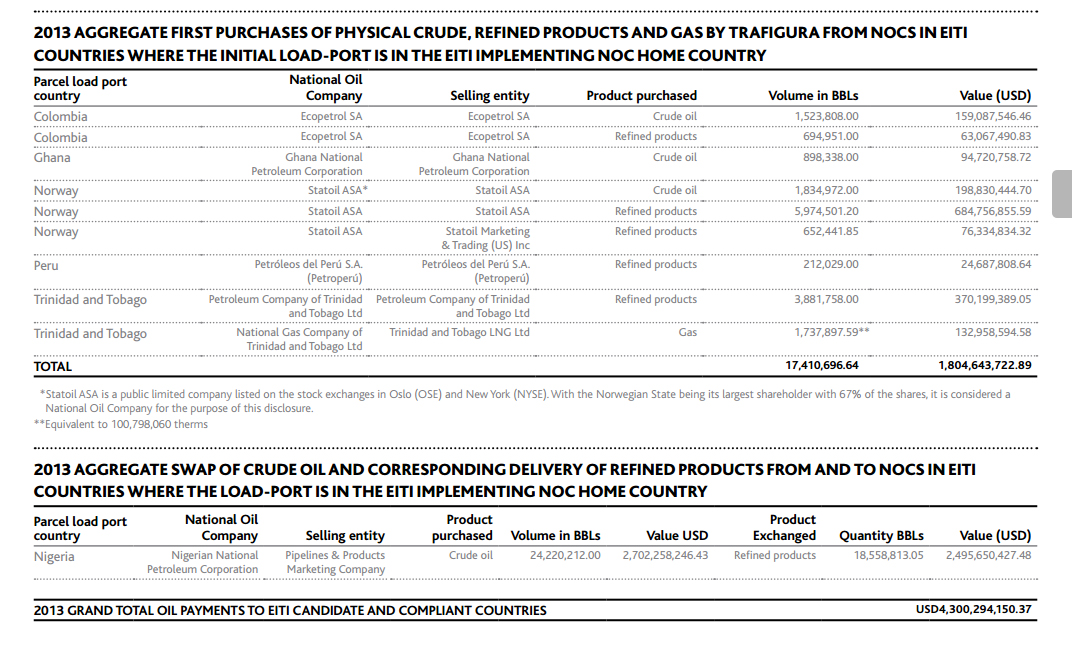
Trafigura Disclosures a Partial Win for Trading Transparency
Today, Switzerland-based trading house Trafigura disclosed how much it paid to several governments in exchange for commodities in its first annual responsibility report. For decades, physical commodity traders have embraced secrecy as a basic part of their business model, even when dealing with public institutions. The disclosures by Trafigura represent a much-needed step away from this unfortunate tradition. There remains, however, ample room for improvement.
The data released today cover a total of $4.3 billion in payments made by Trafigura in 2013 to the national oil companies of Colombia, Ghana, Nigeria, Norway, Peru and Trinidad—countries chosen by Trafigura because they participate in the Extractive Industries Transparency Initiative (EITI).
The data from Ghana illustrate the value of this kind of reporting. Reports by Ghana EITI and the government’s Public Interest and Accountability Committee had already revealed that the national oil company sold a cargo of 898,338 barrels of crude on 1 November 2013 for $95 million, but the buyer was not known publicly. Today, Trafigura was revealed as the purchaser.
This single transaction generated over 10 percent of the country’s total oil revenues that year, and therefore warrants full reporting within broader efforts to achieve revenue transparency. Disclosures like Trafigura’s can help oversight actors to understand and monitor deals entered into by the Ghanaian government that materially impact the financial wellbeing of the state. Several such deals—including a large oil-backed loan from the Chinese government and another loan under consideration with Trafigura itself—include oil sales by the national oil company as key components.
There are several ways that Trafigura (and companies seeking to follow its lead) could improve this type of reporting:
-
Include non-EITI countries: Many of the countries where transparency is needed most do not participate in EITI. Companies should not use the EITI as a reason to avoid reporting on their operations in these environments. For instance, Trafigura has extensive business dealings with the national oil company of Angola, and
buys as much as 480,000 barrels per day in crude from majority state-owned Rosneft of Russia. Neither country is part of EITI. Because voluntary initiatives like EITI typically lead to uneven reporting, NRGI and leading Swiss civil society groups have recommended that the Swiss government include trading in its forthcoming extractive sector transparency legislation. -
Provide sale-by-sale data: Since oil sale transactions tend to be large and industry players already circulate a fair amount of per-sale data amongst themselves, providing information about each sale is not infeasible for traders. Providing detailed data from a previous year would also not harm a trader’s commercial interests, unless that company received an inappropriately high discount from a government seller. (Trafigura ended up providing per-sale data for its Ghana purchases, since it bought only one cargo, but the other figures are annual aggregates.)
-
Cover more recent years. The Trafigura report notes that EITI requires implementing countries to publish data that is no more than two years old. There is no reason, however, why a company with Trafigura’s analytical sophistication should only meet the minimum standard of timeliness. Presumably, Trafigura could have easily included 2014 data, which would be even more relevant to users.
As Trafigura notes, “disclosure can assist in improving governance in resource-rich countries.” This acknowledgement, the company’s active participation in discussions around how to advance transparency and the initial disclosures made today are commendable. Further action is needed from Trafigura, its peer companies and the Swiss government to deliver the kind of comprehensive and timely disclosures that truly can make difference.
Alexandra Gillies is the director of governance programs at the Natural Resource Governance Institute (NRGI).
A reproduction of the payment data disclosures in Trafigura’s 2015 Responsibility Report (see page 17). Click on the image for a larger version.

